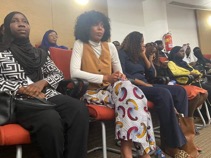
In an interview with The Point, she said: “Now that the country’s lawmakers have maintained the law banning the practice, we will do everything possible in ensuring that the law is fully implemented by the relevant authorities. These are cultural practices that have enormous complication in the well-being of women and girls,” she claimed.
It could be recalled that the National Assembly recently upheld repealing the ban on FGM. The decision reaffirms that FGM remains illegal in the country, with violators facing the full force of the law.
“We are going to ensure that the law is fully implemented. I can assure you that if we know anyone who is being mutilated, we will report the matter to the relevant authorities. We have to do away with the culture of ‘maslaha’ syndrome with a view to enable us protect and safeguard our children from any cultural practice that is harmful and have health complication,” she said.
Jaha Dukureh, another anti-FGM survivor expressed relief and determination following the legislative decision, saying: “I am so happy to see that Gambian lawmakers have kept the ban on FGM. I will do everything possible to ensure that the lives and rights of Gambian girls are protected,” she postulated.
Anna Njie, President of the Female Lawyers Association Gambia (FLAG), voiced her disappointment at the initial attempt to repeal the ban, adding: “It is so disappointing as a country to even at the first place attempt to repeal this law. We have moved forward in terms of protecting women and girls. Therefore, repealing the FGM laws would have been disappointing.”
For many in The Gambia, the practice of FGM is deeply rooted in cultural and religious traditions. However, the recent decision by lawmakers serves as a reminder that the rights and safety of women and girls must take precedence, and that the fight against FGM in The Gambia is far from over.
FGM is prohibited in the country by the Women (Amendment) Act 2015, which was passed by the government in 2015.
FGM/C is illegal and punishable under Sections 32A and 32B, which also outline the penalties for executing, obtaining, and encouraging the practice.
Under Section 32B (1), the Act defines who an accomplice is which states that ‘An accomplice is any person who aids or abets the person committing the offense of FGM. Therefore, such a person who requests, incites or promotes FGM by providing tools or any other means meant to carry out the practice is punishable for 3 years imprisonment or a fine of D50,000 (fifty thousand dalasis) or both.
By this, it means any person who promotes or incites people to practice FGM can be held liable under this law.





